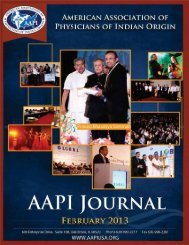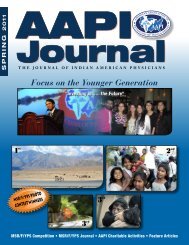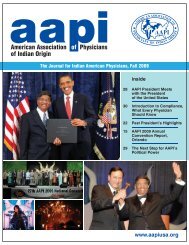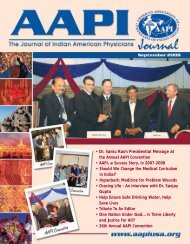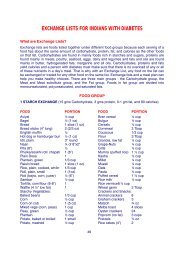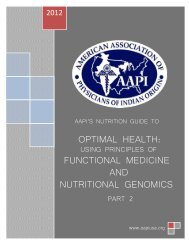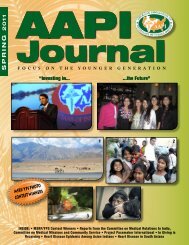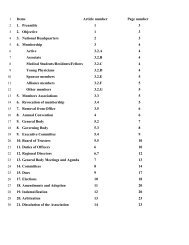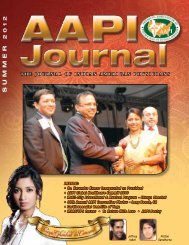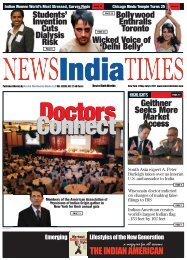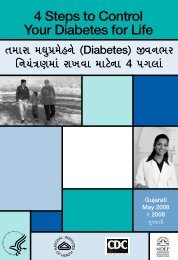Great Equalization: Is MBBS From India Equal To M.D. In U.S.A?
Great Equalization: Is MBBS From India Equal To M.D. In U.S.A?
Great Equalization: Is MBBS From India Equal To M.D. In U.S.A?
You also want an ePaper? Increase the reach of your titles
YUMPU automatically turns print PDFs into web optimized ePapers that Google loves.
AAPI Journal • March 2009<br />
FEATURE<br />
Crisis!<br />
by Dr. M. P. Ravindra Nathan<br />
M. P. Ravindra Nathan, M.D.<br />
Brooksville, Florida<br />
“Come to the office right away”,<br />
Becky, my nurse, interrupted my<br />
ICU rounds. “Sally fell in the<br />
examining room. I think she has a<br />
fractured hip,” her words exploded<br />
in my ears. Knowing the patient<br />
well, I panicked sensing this could<br />
portend her end.<br />
When Sally presented to me for<br />
the first time, she looked like living<br />
death; very frail and much older<br />
than her age of 60 years. She was a<br />
poor Medicaid patient from another<br />
town where no cardiologist would<br />
accept her. I was the new kid in<br />
town and coming from a teaching<br />
hospital, I was fascinated with the<br />
challenge she offered, too naive to<br />
think in terms of dollars and cents.<br />
Boy, did she turn out to be some<br />
challenge! Sally had chronic<br />
rheumatic heart disease and already<br />
had three mitral valve surgeries.<br />
She currently had a dysfunctional<br />
prosthesis with severe mitral<br />
regurgitation and a baggy left<br />
ventricle which looked more like<br />
end stage cardiomyopathy. Type II<br />
diabetes, peripheral and carotid<br />
vascular disease were additional<br />
burdens to cope with. As expected,<br />
she developed severe heart failure<br />
complicated by pleural effusion and<br />
ascites. During the next several<br />
months, Sally needed multiple<br />
hospitalizations. I thought each one<br />
would be her last, but her<br />
indomitable will and undying<br />
optimism pulled her out.<br />
My nurse even delivered diuretics<br />
and antibiotics to her home, as she<br />
had no money or reliable<br />
24 www.aapiusa.org<br />
transportation. I never saw or talked<br />
to any of her relatives, including the<br />
daughter who worked for a local<br />
dentist, with whom she lived<br />
sporadically. Her folks had<br />
seemingly abandoned her, Sally<br />
having become a big liability.<br />
There was near pandemonium in<br />
the office, by the time I reached<br />
there. Sally was on the floor, quite<br />
short of breath and pale. The nurse<br />
was administering oxygen. The<br />
ambulance promptly arrived to take<br />
her to the ICU. I wanted to inform<br />
the relatives but she gave me,<br />
between short and difficult breaths,<br />
her usual answer: “Oh, don't bother<br />
to call my children, they don’t care.<br />
You are my family, Dr. Nathan, I<br />
trust your judgment”.<br />
During the last few years, amidst<br />
many critical care admissions, there<br />
were no enquiries from the family.<br />
Becky and I were her sole<br />
guardians, literally. I liked and<br />
respected her almost like my mother<br />
and she, of course, was very grateful<br />
for the attention we showered on<br />
her. She used to become visibly<br />
upset whenever we mentioned her<br />
relatives. <strong>To</strong> make matters worse,<br />
Sally developed carcinoma cervix<br />
with pelvic metastasis, and I had to<br />
use my wit and charms on one of<br />
our radiation oncologists to accept<br />
her as his patient. <strong>In</strong>itially, she<br />
couldn't even lie down long enough<br />
for radium implantation and I had to<br />
readmit her to relieve her<br />
pulmonary congestion before she<br />
could complete a course of<br />
radiation therapy.<br />
Now Sally is in the intensive care<br />
unit (ICU), with a fracture of the left<br />
hip and was steadily going downhill<br />
with full-blown heart failure, almost<br />
into cardiogenic shock. An<br />
emergency thoracentesis yielded a<br />
liter of pleural fluid. Her diabetes<br />
was out of control. She was in Atrial<br />
Fibrillation with rapid ventricular<br />
rate and a BP of 90/60 mm of Hg.<br />
The orthopedic surgeon was<br />
reluctant even to touch her and the<br />
anesthesiologist didn't like the idea<br />
of her dying in the operating room;<br />
the risk was much too high, for<br />
surgery. And without surgery, Sally<br />
would never walk in the near future.<br />
Just then, the ICU nurse<br />
announced there is a bunch of<br />
relatives waiting to see me. “Finally,<br />
I get to see Sally's folks, it's about<br />
time,” I thought. My enthusiasm was<br />
very short lived. I saw a half a<br />
dozen hostile, irate faces in the<br />
conference room. The eldest<br />
daughter, the self-appointed<br />
spokesperson of the family, had only<br />
one question for me:<br />
“Doc, what is the name of your<br />
insurance company?”<br />
I was stunned and speechless for a<br />
moment. Trying not to show my<br />
rage, I politely replied, “But first,<br />
don't you want to know how your<br />
mother is doing?”<br />
“Well, she fell in your office,<br />
didn't she?”<br />
Without mincing words, a clear<br />
message was delivered. A barrage of<br />
Continued on page 25



